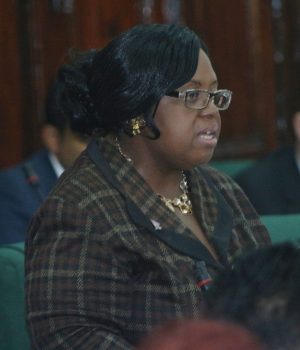The government majority in the National Assembly on Thursday voted against a motion for the re-establishment of a Ministry of Labour.
The vote was 33 to 25.
Minister of Social Protection Amna Ally within whose ministry the Department of Labour operates argued that the motion brought by Opposition Parliamenta-rian Gillian Burton-Persaud was “baseless” and unnecessary since the functions are being adequately performed.
“A simple name modification has not impacted the work of the department of Labour, there is still a minister designated to handle all labour matters therefore this motion is baseless,” Ally argued in the House.

Burton-Persaud explained that at this year’s May Day rally a call was made for a Motion to be laid in the Assembly in relation to the re-establishment of the Ministry of Labour therefore the Assembly was being directed to call on the Government to support the call of the joint trade union movement and restore the Ministry of Labour to its pre-2015 status as soon as possible.
She argued that the Ministry of Labour which existed before the General Elections of May, 2015 has since become a department within the Ministry of Social Protection headed by a Junior Minister whose silence on the motion showed him to be nothing but window dressing.
Minister Keith Scott who executes the duties with respect to Labour did not speak on the motion. In fact while the opposition fielded six speakers only two members of the Government benches spoke on the issue.
Ally challenged Burton-Persaud’s argument noting that prior to 2015, there was no standalone Ministry of Labour rather a Ministry of Labour, Human Services and Social Security from which the Minister of Labour operated, a situation similar to what obtains now.
However Burton-Persaud countered that there is no Ministry or Minister which holds the gazetted responsibility for labour matters.
“I remind this House that prior to 2015 the responsibilities were gazetted…where in the Official Gazette are the Ministry of Social Protection and Department of Labour’s responsibilities?” she asked.
Since January 2016 the APNU+AFC government has gazetted the Duties and Responsibilities of Ministers five times to account for various re-shuffling of responsibilities within the present Cabinet but none of these instances includes a list of matters and or group of matters which fall under the purview of the Ministry of Social Protection. Notably the January 6, 2016 Extraordinary Gazette which should’ve recorded Minister Scott’s assumption of labour responsibilities following the transfer of Minister Simona Broomes from the Ministry of Social Protection does not identify the specific duties or agencies for which the Minister is responsible.
As Burton-Persaud called for direction to the gazette which records these responsibilities, Ally could be heard heckling her to read all of them again.
In speaking to the House, Ally defended the positioning of the Department of Labour by noting that there is a clear nexus between social protection, quality job creation and sustainable economic growth as clearly laid out in the International Labour Organisation’s (ILO) Social Protection floor recommendation of 2012.
“It identifies social security as an important tool to prevent and reduce poverty, inequality, social exclusion and social insecurity to promote equal opportunity and gender and race equality and to support the transition from informal to formal employment,” the Minister stressed, adding that there is a particularly strong emphasis on the coordination of social protection policies with the promotion of protective economic activity and formal employment policies that can be conducive to these purposes so labour and social protection go hand in hand
These policies include government credit provision, labour inspection, labour market policies and the promotion of education, vocational training, productive skills and employability.
She further argued that four equally important strategic objectives through which the decent work agenda is expressed are inseparable, interrelated and mutually supportive and their promotion is part of the International Labour Organisation (ILO) global and integrated strategy for decent work
These objectives are the promotion of productive employment, the development of social protection, the promotion of social dialogue and tripartism (state, business and labour) and the realization of the fundamental principles and rights at work.
The minister concluded that the motion lacked integrity and could not withstand the rigours of good governance before urging the opposition to withdraw it.
The motion was not withdrawn and the speaker called for a vote which saw the opposition voting in favour while the government side of the House voted against.
Opposition Chief Whip Gail Teixeira called for a division which saw the motion defeated 33 to 25.
Infamy
Trade unionist Lincoln Lewis who has been advocating for the restoration of the Ministry of Labour has strongly criticised the government’s decision to vote against it. In a letter in yesterday’s Stabroek News, Lewis said
“Minister Ally is the General Secretary of the PNCR, the party whose government under the leadership of Prime Minister Burnham joined the International Labour Organisation in 1966, the same year this country attained political independence. Friday 20th July will not only go down as a day of infamy for Guyana, but also the PNCR who under successive governments had established and given preeminence to a Ministry of Labour”, he said.
He also criticised members of the governing coalition for their votes against the motion.
“The WPA’s vote surprised because this party in its formation and activism over the years sought to distinguish itself as the true champion of the working class. The AFC led this society to believe it entered politics to be an agent of change but proved, in this instance, once the living is good it is capable of stomping on its professed change-agent credential. The talk by this administration about national unity has to be taken with a grain of salt for unity is hinged on respecting diversity, fundamental rights and freedoms, including that to question, and equal treatment in society.
“The working class is in for rougher times and we have to be prepared to band our bellies and shoulder on, for there is nothing worse than having to live in an environment where ignorance and intolerance override. Workers have power and exercise this power in various forms, including at the ballot box. We shall not forget 20th July 2018”, Lewis said.






